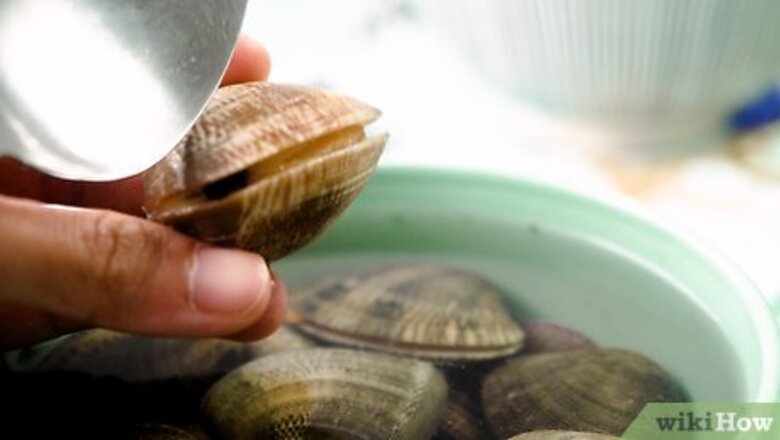
views
Removing Sand and Dirt
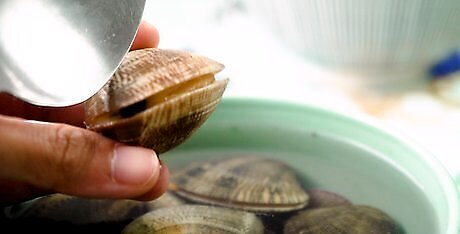
Tap clams with an open shell and toss them if they don't close. When clams rest, they sometimes open their shells slightly. Go through your batch of clams and pick out each one with an open shell. Give it a slight tap with a spoon. If the shell closes, the clam is alive. If it stays open, then the clam is dead. Discard any dead clams. Every clam batch has 1 or 2 bad clams, so don’t worry if you find a few dead ones. Never eat clams that were dead before cooking. They could be contaminated with bacteria and make you sick.
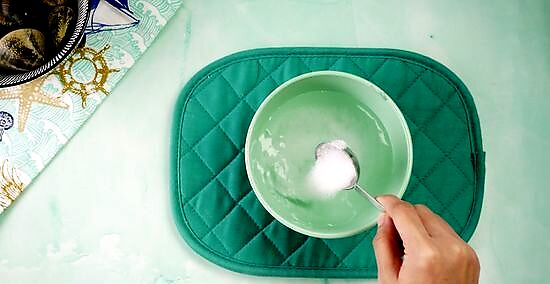
Soak the clams in cool saltwater for 1 hour to remove any sand. Fill a bowl with cool water and dissolve 1 tablespoon (14.8 ml) (17 g) of sea salt for each quart (0.9 L) of water. Place all the clams in the bowl and let them soak for an hour. The clams will open up and start expelling any sand they had inside them. The water may start getting cloudy. This is normal, and means the clams are being cleaned. The clams may also extend their tongues slightly out of their shells. This is also normal.
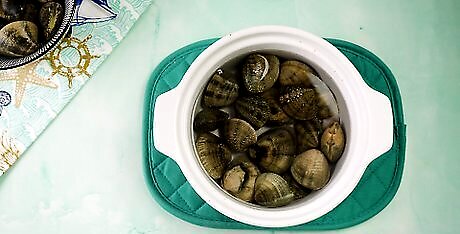
Transfer the clams to another bowl of clean saltwater and soak for 20 minutes. After an hour, the original water will probably be full of sand. Fill a clean bowl with water and the same salt mixture you used before. Then take each clam out and place it in the new bowl for another 20 minutes. Remove the clams by hand when you take them out. If you use a spoon, you could pick up some settled sand and re-contaminate the clams.
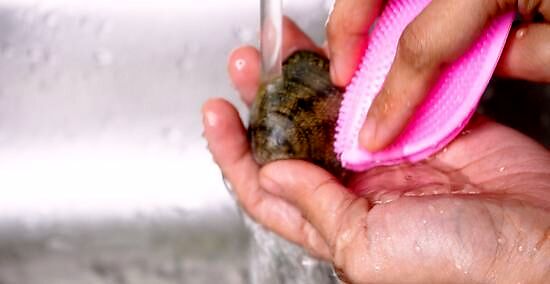
Scrub the clams under running water to remove remaining dirt. Take each clam out of the bowl and hold it under a running faucet. Use a brush and scrub each clam’s shell to remove any remaining dirt.
Boiling the Clams
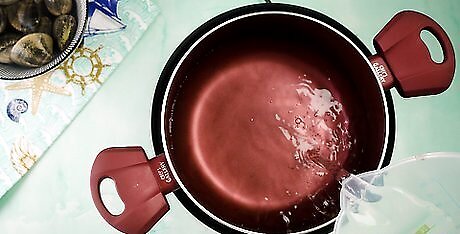
Fill a large pot halfway with water. The size of the pot depends on the amount of clams and other ingredients you use. For a small gathering, an 8-12-quart (7.5-11.3 L) pot holds plenty. For larger gatherings, you may need a 16-quart (15.1 L) pot. Whichever you use, only fill it up halfway so the ingredients don’t overflow the pot when you add them.

Add any seasonings to the water that you want to use. Cooking clams in plain water leaves them tasting bland. Seasoning the water adds flavor and a pleasant aroma while the clams boil. There is no rule on which seasonings to add, so it's up to your preference. Common flavorings are salt, thyme, onions, rosemary, and garlic. Sprinkle some in and taste the water, then adjust the mixture as you want to. For flavor, you can add 1 cup (240 ml) of white wine or a bottle of lager beer to the water. Slicing up a lemon and throwing it into the water also adds flavor and helps with the fishy smell from the clams.
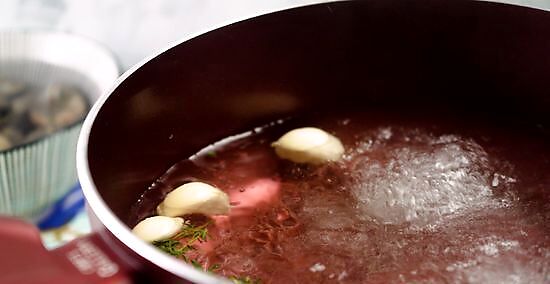
Bring the water to a boil over a high heat. Place the pot on a stovetop and turn on a high flame. Keep the flame on high until the water starts boiling. A large pot like this will be heavy. Make sure you’re strong enough to lift and carry it, or have someone nearby who is. Depending on the size of the pot, the water may take 10-15 minutes to boil or longer. Make sure you start boiling early enough so the meal will be ready in time. Cover the pot to speed up the boiling process.
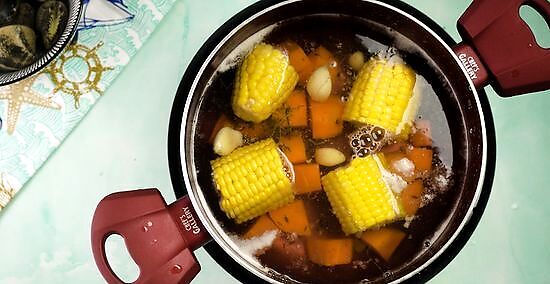
Add other ingredients like vegetables or sausage if you’re using them. If you’re doing a full seafood dinner, then add the other ingredients before adding the clams. Common ingredients are corn, potatoes, carrots, and sausage. These ingredients are more durable than the clams and need more cooking, so add them and let them cook for 10-20 minutes before pouring in the clams. The time for each ingredient varies. In general, potatoes need 20 minutes more than the other ingredients, and sausage, corn, and carrots need 5 minutes more. If you’re adding all of them, add the potatoes first, then 20 minutes later add the other ingredients, then 5 minutes later add the clams. If you’re not using any other ingredients, then skip this step and just add the clams when the water boils.

Pour the clams into the boiling water. After the other ingredients have cooked, or if you aren’t using any other ingredients, add the clams to the boiling water. Be careful when pouring them in to avoid splashing hot water. To avoid splashing, you can use tongs to place each clam in individually, rather than pouring them all in at once. Keep an eye on the water level while adding these ingredients. If you added too much water, the pot could overflow. Try scooping some water out with a smaller pot if the level is close to the top.

Boil the clams for 8-10 minutes, until they open. Let the clams and the other ingredients cook together. Leave the pot uncovered. Keep the water boiling, but adjust the temperature if the pot looks like it’s close to boiling over. After 8-10 minutes, the clams will start opening, indicating that they’re finished. Turn off the heat after 10 minutes. Overcooked clams are very tough, so don’t boil them too long. 10 minutes is enough time. Don’t try to wait until all the clams open, because some may have been dead before you put them in the pot. If you wait too long, all the other clams will be overcooked. If you’re using little neck clams, they cook faster. Boil them for 5 minutes instead.
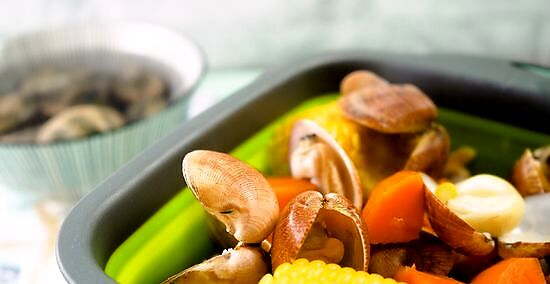
Scoop the ingredients into a colander to drain. Place a colander in the sink. Then use tongs, a strainer, or scooping spoon and remove all the ingredients. Place them into a colander and let them sit for a few minutes to drain. Don’t try to pour all the water and ingredients into a colander. This is a heavy pot, and you might splash hot water around if you try to drain it all at once.
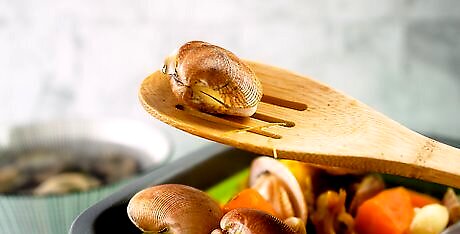
Discard any clams that didn’t open. Every clam batch has a few bad clams. If a clam was dead when you placed it in the pot, then it won’t open. Don’t eat clams that didn’t open, because they could be contaminated with bacteria. Pick out the ones that are still closed and throw them away.
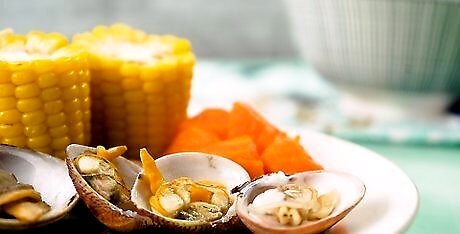
Serve the clams plain or as part of a larger meal. Once the clams are boiled, you have plenty of options for how to serve them. If you cooked the clams with other ingredients, then spread them all out on a large plate and let your guests dig in. Boiled clams are also a great topping for pasta. If you prefer, you can just eat them plain right out of the shell. Squeeze a little lemon juice over the dish to add flavor and also help reduce the fishy smell. Cooked clams can last 3-4 days in the refrigerator if you have leftovers. Freezing isn't a good storage option because they'll become very tough and leathery.















Comments
0 comment